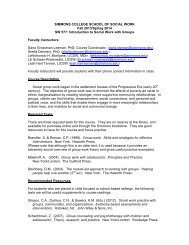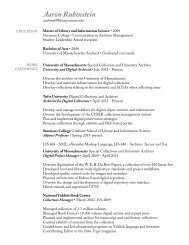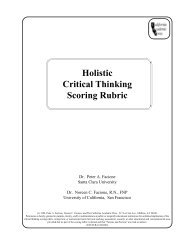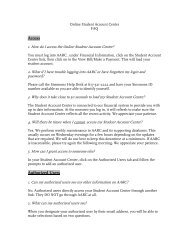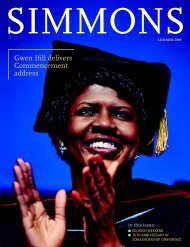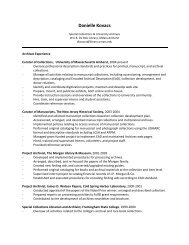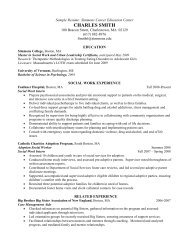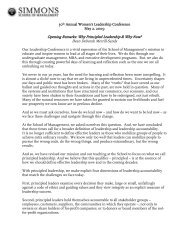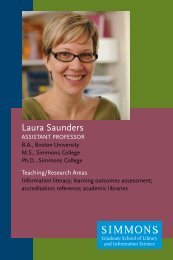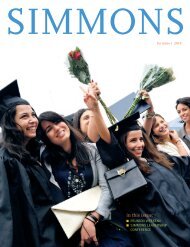Incorporating Emotional Intelligence into the Preparation and ...
Incorporating Emotional Intelligence into the Preparation and ...
Incorporating Emotional Intelligence into the Preparation and ...
Create successful ePaper yourself
Turn your PDF publications into a flip-book with our unique Google optimized e-Paper software.
The CourseWe believe that <strong>the</strong> travel course overall benefits from <strong>the</strong> inclusion of EI. This happens in a numberof ways. First, study <strong>and</strong> discussion of EI legitimizes real concerns that students have about <strong>the</strong> travelcourse process. By allowing for open <strong>and</strong> honest discussion of concerns, <strong>the</strong> underlying fears can bemanaged ra<strong>the</strong>r than staying hidden to crop up later, perhaps with unfortunate consequences. Second, <strong>the</strong>travel course that takes account of process issues is likely to run more smoothly than <strong>the</strong> one that doesn’t.Third, <strong>the</strong> inclusions of EI serves as a model of advanced planning that all students interested incompetent business management derive benefit in observing (for more on <strong>the</strong> addition of EI training to<strong>the</strong> classroom, see Tucker <strong>and</strong> Sojke, 2000). Fourth, by adding process issues to a course where <strong>the</strong>y arenot expected, student value is delivered above <strong>and</strong> beyond what had been anticipated. Finally, a wellmanagedcourse is more likely to attract student attention <strong>and</strong> dem<strong>and</strong>. This builds course enrollment <strong>and</strong>encourages <strong>the</strong> development of additional travel courses by <strong>the</strong> institution.The Group of TravelersAs <strong>the</strong> long history of research <strong>into</strong> teams <strong>and</strong> groups has demonstrated, groups of people willbehave in ways that individuals will not. Additionally, it is recognized that groups (in this case <strong>the</strong> studenttravelers) develop in predictable stages. Introducing <strong>the</strong> ideas of EI up front during <strong>the</strong> forming <strong>and</strong>norming stages allows <strong>the</strong> topics of emotions, stress, coping, <strong>and</strong> relationships to be legitimized as anappropriate element of <strong>the</strong> course of study <strong>and</strong> of <strong>the</strong> group’s experiences. This will <strong>the</strong>n hopefully provevaluable in <strong>the</strong> inevitable storming stage (Tuckman & Jensen, 1977). Moreover, when a group of relativestrangers travels toge<strong>the</strong>r over many days <strong>and</strong> long distances, it is certain that stresses, incompatibilitiesof personalities, honest disagreements, <strong>and</strong> ineffective communication will lead <strong>the</strong> group to be less thanoptimally successful. As a result, it is imperative that <strong>the</strong> EI competencies of collaboration, cooperation,<strong>and</strong> communication be dealt with directly <strong>and</strong> carefully. The benefits to this proactive approach will likelyinclude increased listening, growth from conflict <strong>and</strong> adversity, <strong>the</strong> facilitation of effectivecommunication, <strong>and</strong> <strong>the</strong> development of a more closely-knit community (Druskat & Wolff, 2001).The Sponsoring InstitutionWhen students travel internationally <strong>the</strong>y become de-facto ambassadors not only of <strong>the</strong>ir homecountries but also of <strong>the</strong>ir sponsoring institutions. Hosts <strong>and</strong> o<strong>the</strong>rs in <strong>the</strong> visited country will formimpressions of <strong>the</strong> institution based on <strong>the</strong> behavior of <strong>the</strong> students. It is for this reason that <strong>the</strong> institutionhas a great deal to gain/lose by <strong>the</strong> laudable/deplorable behavior on <strong>the</strong> part of its students. For example,some years ago one of our students traveled to Asia where <strong>the</strong> st<strong>and</strong>ards of food preparation wereconsiderably different from those in <strong>the</strong> States. This student, who had previously been a nurse (<strong>and</strong> was<strong>the</strong>refore especially knowledgeable about sanitation), became greatly concerned about her health <strong>and</strong>safety. Unfortunately, her concern was so extreme (<strong>and</strong> in reality based on limited evidence) that it notonly interfered with her ability to participate in meals with her colleagues, but also led her to makefrequent, vocal complaints that her colleagues found disruptive. Moreover, <strong>the</strong> hosts were greatly insulted<strong>and</strong> expressed some concern about inviting our students back in <strong>the</strong> future! Clearly, this individual’s poormanagement of her reactions had immediate negative repercussions. Her responses also had <strong>the</strong> potentialto damage <strong>the</strong> reputation of our institution <strong>and</strong> our ongoing relationship with our hosts.Suggestions for <strong>Incorporating</strong> EI Competency Building <strong>into</strong> <strong>the</strong> Planning <strong>and</strong> Delivery ofInternational Travel CoursesOur suggestions for incorporating EI competency building <strong>into</strong> <strong>the</strong> planning <strong>and</strong> delivery ofinternational travel courses are based on our own experience in integrating this practice <strong>into</strong> an MBAtravel course curriculum <strong>and</strong> on <strong>the</strong> literature that has developed around training for increased emotionalintelligence (Cherniss & Adler, 2000; Cherniss & Goleman, 2001b). We take <strong>into</strong> consideration <strong>the</strong> fact<strong>Emotional</strong> <strong>Intelligence</strong> Competency Building for International Travel Course Participants 7



